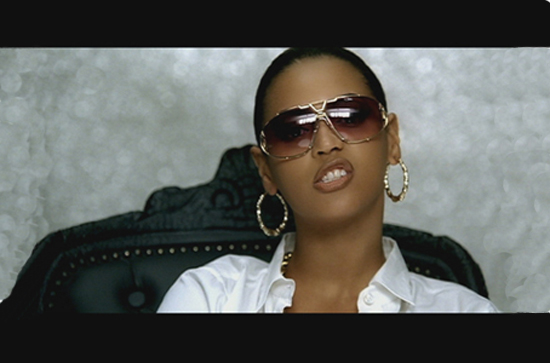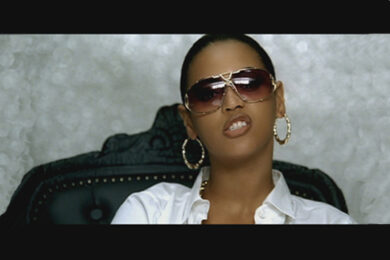In a pithy end-of-year piece for the Village Voice, ‘Katy Perry, Ke$ha, and the great gay pander-off of 2010’, brilliant culture commentator Rich Juzwiak (whose fourfour blog should be required reading for UK music critics) complained of "hyper-femme girls like Lady Gaga, Katy Perry, Ke$ha, P!nk, and, yes, Nicki Minaj…. swooping in to rescue us gays." P!nk, a hyper-femme – really? The use of the dismissive ‘girls’ to describe these women artists aside, Juzwiak’s complaint – that straight women are courting gay listeners by appropriating unthreatening gay semiotics – relies on the common assumption that femme is the most palatable form of queer expression. But femme, a queer gender strategy with a century of transgressive history (cf Joan Nestle’s The Persistent Desire: A Butch-Femme Reader), cannot be easily equated to straight femininity, and to liken Katy Perry to Ke$ha is to miss a world of difference – difference that locates itself in gender variance, that doesn’t stop at mere titillation; difference that excites and threatens.
"Wake up in the morning feelin’ like P Diddy," Ke$ha’s breakthrough single, ‘Tik Tok’, begins, as Ke$ha lounges in a bathtub in shorts and cowboy boots, before boasting of brushing her teeth with Jack Daniels and roaming the neighbourhood on a gold low-rise. Contrast Ke$ha’s pimped-out swag with Katy Perry in the ‘California Girls’ video – all cupcakes and candy canes, femininity as confection – and it becomes clear that there’s not one single, simple gender ideal being sold. ‘California Girls’ has been widely and fairly criticised for its misogyny, but even Perry’s excruciatingly fluffy pin-up girl poses have their moments of threat, as she wanders across the Candyland of her fictional California liberating her hyperreal sisters, eating her opponents, shooting whipped cream from her breasts and flicking sand in Snoop Dogg’s face.
Chart pop like Perry’s might be expected to make use of avant-garde gender strategies in its videos. Less predictable was Beyoncé’s ‘If I Were A Boy’, her role-reversal with a fictional boyfriend, whose video presents her as a wisecracking cop, hair scraped back and growling as she bends some perp over the hood of her car, before retiring to a bar to drunkenly humiliate her partner. Though the song’s concerns are well within R&B’s standard preoccupation with straight relationships and the gendered behaviour that makes them so tough, Beyoncé’s appropriation of the male voice, and her description of loving and betraying a woman, are direct transgressions against the gender norms the song describes. Nor is this Beyoncé’s first time in a button-down shirt: her brief and hilarious turn as Jay-Z in 2007’s ‘Upgrade U’ video once again sees Beyoncé playfully undermining her gender in performance. The song presents Beyoncé as a feminine object of desire, adding brand value to her mate with beauty and street smarts ("I can do for you what Martin did for the people/ ran by the man but the women keep the tempo", "you need a real woman in your life/ takin’ care of home but still fly/ and I’ma help you build up your account"), while Jay-Z’s guest spot promises luxury goodies of various kinds in return. As butch-Beyoncé mimes his verse, chewing on a toothpick and snarling with legs spread wide, her femme counterpart stalks the set in a satin nightie and heels, dropping and winding to the rhythm of her lover’s voice. Interestingly, when Beyoncé more explicitly plays up her queer subtext, in Lady Gaga’s ‘Telephone’ video, it’s as a strike against sexism and restriction: she and Gaga (at her most deliberately unsexy, insectoid and awkward) conspire to murder Beyoncé’s controlling, leering boyfriend, before taking off together into the sunset, hand in hand.
Less subtly gender-transgressive is Jessie J’s debut single ‘Do It Like A Dude’, whose chorus proclaims ‘I can do it like a brother, do it like a dude/ grab my crotch, wear my hat low like you/ we can do it like the mandem, mandem’. As well as gender transgressive, the song and its video are explicitly queer, with Jessie J surrounded by butch Black women, and including scenes of women kissing (though these are notably white, blonde and femme). Even more than Ke$ha, wound into Jessie J’s butch drag are the gender norms of the R&B and urban pop she loves: ‘do it like a brother’ and ‘do it like a dude’ are synonymous in this universe, and her references to black culture – specifically, to pimp culture, an equivalency problematic in itself – are at times embarassing (‘rollin’ rollin’ rollin’ rollin’ money like a pimp/ my B.I.T.C. He’s on my dick like this’ springs to mind). Yet for all its occasional crassness, ‘Do It Like A Dude’ is a joyfully angry read on sex and gender, and a daring debut for a chartable artist.
Hip-hop might be thought of as a bastion of oppressive gender ideals, but nowhere is gender transgression so overt as in the work of breakthrough hip-hop artist, Nicki Minaj. Her use of multiple characters, including male characters, her explicit references to sex with both men and women, her insistence on having a dick, especially when insulting other male artists, and her battles with the most prominent male rappers of her generation before her debut album was even released, are all unique in mainstream hip-hop. Her voice, its elasticity, its incredible shudder and stutter, is an oral representation of the shakiness of the boundaries she tramples over. In ‘Did It On ‘Em’, she boasts: "All these bitches is my sons / and I’ma go and get some bibs for ’em /a couple formulas, little pretty lids on ’em / if I had a dick I would pull it out & piss on ’em / lemme shake it off / I just signed a couple deals, I might break you off," while in ‘Roman’s Revenge’, which sees her adopt the persona of her gay male rapper character, Roman Zolanski, she begins, "I am not Jasmine, I am Aladdin", before confounding even this: "and I’m a bad bitch, I’m a cunt / and I’ll kick that ho, punt."
In the video for Kanye West’s ‘Monster’, on which Minaj guests with Jay-Z, Minaj represents herself as both Roman (in Nicki drag) and Harajuku Barbie, her hyper-femme Valley Girl incarnation. In a video that elsewhere presents women as lifeless – either vampires or zombies – Minaj’s verses are vibrantly alive, writhing with the insinuations that her characters bring to the screen. In a scene like an S&M ‘Upgrade U’, Harajuku Barbie is tied to a chair while Roman stalks, caresses and threatens her; they swap boasts with increasing frequency. Roman describes his Nicki drag (‘hairdresser from Milan is the monsta do / monsta Giuseppe heel is the monsta shoe’), Barb points out ‘let me get this straight, wait, I’m the rookie/but my features and my shows ten times your pay,’ before the lyrical trade-off becomes so rapid that boundaries are once again blurred, the characters begin to merge, and the final line of the song concludes ‘RAWR, I’m a mothafuckin’ monsta’. It’s a stunning articulation of a hybrid self beyond standard concepts of gender, revealing Minaj as a truly experimental artist in the vein of Sun Ra, Prince or George Clinton, all of whom use surreal persona to articulate an escape from restrictive, racist political constructions of identity. Similarly, Minaj’s work uses joyful imagination to propel her beyond the sexism and homophobia so prevalent in hip-hop – and the opportunities she leaves in her wake may well see others take up that challenge.



